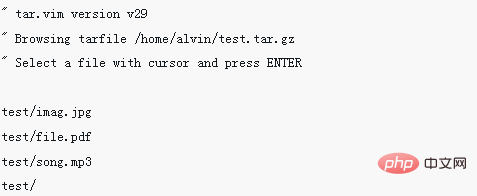 Operation and Maintenance
Operation and Maintenance
 Linux Operation and Maintenance
Linux Operation and Maintenance
 How to display compressed file information in linux
How to display compressed file information in linux
How to display compressed file information in linux
Display method: 1. Use Vim editor, syntax "vim compress file"; 2. Use "tar -tf compress file" command; 3. Use "rar v compress file" command; 4. Use " unrar l compress file" command; 5. Use "zip -sf compress file" command; 6. Use "unzip -l compress file" command; 7. Use "zipinfo compress file" command; 8. Use "zcat compress file" command. ; 9. Use "zless to compress files"; 10. Use less.

#The operating environment of this tutorial: linux7.3 system, Dell G3 computer.
10 ways to view the contents of compressed files under Linux
Generally speaking, when we view the contents of archived or compressed files, we need to decompress them first and then view them. ,kind of hard. Today I will introduce to you 10 different methods that allow you to easily view the contents of archived or compressed files without decompressing them.
Technically speaking, it is not possible to view archived or compressed files without decompressing them in advance. In the method introduced in this article, these compressed files will be decompressed in a temporary directory /tmp in the background. After restarting the system, the contents of the /tmp directory will be cleared.
Before discussing further, here is an explanation of archives and compressed files.
-
Archivingis the process of combining multiple files or folders into one file. In this case, the resulting file is not compressed. -
Compressionis a result file obtained by combining multiple files or folders into one file and compressing them.
Archived files are not compressed files, but compressed files can be archived files. After understanding these two concepts, we formally introduce how to view the contents of compressed files without decompressing them.
1. Use the Vim editor
Vim is not just an editor, it also contains many other powerful functions. The following command will directly display the contents of the compressed archive file:
$ vim test.tar.gz

Not only that, using Vim you can even browse the archive file directly, if there is Text file, you can also open it directly, which is very convenient.
If you need to open a text file, just use the arrow keys to move the cursor in front of the file and press the ENTER key. Can be opened
2. Use tar command
tar command can not only be used to compress/decompress files, but also When extracting the tar file, use the tar -tf command to view the contents of the compressed package.
$ tar -tf test.tar
Alternatively, use the -v option to view detailed properties of the archive file, such as permissions, file owner, group, creation date, etc.
$ tar -tvf test.tar
3. Use the rar command
Similarly, without extracting the rar file You can use the rar v command to view the contents of the compressed package.
$ rar v test.rar
4. Use the unrar command
For the above rar file, you can also use The unrar command with l parameter views the contents of the rar file.
$ unrar l test.rar
5. Use zip command
Can be used without extracting the zip file zip -sf command to view its contents.
$ zip -sf test.zip
6. Use the unzip command
is similar to unrar, use the -l parameter unzip command to view the contents of the zip file.
$ unzip -l test.zip
7. Use the zipinfo command
to view the contents of the zip file. You can also use zipinfo command, execute the zipinfo command to get the detailed information of the zip compressed file.
$ zipinfo test.zip
zipinfo -v haicoder.zip
8.使用 zcat 命令
使用 zcat 命令查看归档/压缩文件。
$ zcat test.tar.gz
zcat 与 gunzip -c 命令功能相同。因此,你还可以用下面的命令:
$ gunzip -c test.tar.gz
9.使用 zless 命令
使用 zless 命令查看归档/压缩文件。
$ zless test.tar.gz
zless 类似于 less ,它可以逐页显示内容。
10.使用 less 命令
less 命令大家都可能有所了解了,它能以交互的方式查看文件内容。不仅如此,它还可以用来查看归档/压缩文件的内容:
$ less test.tar.gz
相关推荐:《Linux视频教程》
The above is the detailed content of How to display compressed file information in linux. For more information, please follow other related articles on the PHP Chinese website!

Hot AI Tools

Undresser.AI Undress
AI-powered app for creating realistic nude photos

AI Clothes Remover
Online AI tool for removing clothes from photos.

Undress AI Tool
Undress images for free

Clothoff.io
AI clothes remover

Video Face Swap
Swap faces in any video effortlessly with our completely free AI face swap tool!

Hot Article

Hot Tools

Notepad++7.3.1
Easy-to-use and free code editor

SublimeText3 Chinese version
Chinese version, very easy to use

Zend Studio 13.0.1
Powerful PHP integrated development environment

Dreamweaver CS6
Visual web development tools

SublimeText3 Mac version
God-level code editing software (SublimeText3)

Hot Topics
 What computer configuration is required for vscode
Apr 15, 2025 pm 09:48 PM
What computer configuration is required for vscode
Apr 15, 2025 pm 09:48 PM
VS Code system requirements: Operating system: Windows 10 and above, macOS 10.12 and above, Linux distribution processor: minimum 1.6 GHz, recommended 2.0 GHz and above memory: minimum 512 MB, recommended 4 GB and above storage space: minimum 250 MB, recommended 1 GB and above other requirements: stable network connection, Xorg/Wayland (Linux)
 vscode cannot install extension
Apr 15, 2025 pm 07:18 PM
vscode cannot install extension
Apr 15, 2025 pm 07:18 PM
The reasons for the installation of VS Code extensions may be: network instability, insufficient permissions, system compatibility issues, VS Code version is too old, antivirus software or firewall interference. By checking network connections, permissions, log files, updating VS Code, disabling security software, and restarting VS Code or computers, you can gradually troubleshoot and resolve issues.
 How to run java code in notepad
Apr 16, 2025 pm 07:39 PM
How to run java code in notepad
Apr 16, 2025 pm 07:39 PM
Although Notepad cannot run Java code directly, it can be achieved by using other tools: using the command line compiler (javac) to generate a bytecode file (filename.class). Use the Java interpreter (java) to interpret bytecode, execute the code, and output the result.
 What is vscode What is vscode for?
Apr 15, 2025 pm 06:45 PM
What is vscode What is vscode for?
Apr 15, 2025 pm 06:45 PM
VS Code is the full name Visual Studio Code, which is a free and open source cross-platform code editor and development environment developed by Microsoft. It supports a wide range of programming languages and provides syntax highlighting, code automatic completion, code snippets and smart prompts to improve development efficiency. Through a rich extension ecosystem, users can add extensions to specific needs and languages, such as debuggers, code formatting tools, and Git integrations. VS Code also includes an intuitive debugger that helps quickly find and resolve bugs in your code.
 Can vscode be used for mac
Apr 15, 2025 pm 07:36 PM
Can vscode be used for mac
Apr 15, 2025 pm 07:36 PM
VS Code is available on Mac. It has powerful extensions, Git integration, terminal and debugger, and also offers a wealth of setup options. However, for particularly large projects or highly professional development, VS Code may have performance or functional limitations.
 How to use VSCode
Apr 15, 2025 pm 11:21 PM
How to use VSCode
Apr 15, 2025 pm 11:21 PM
Visual Studio Code (VSCode) is a cross-platform, open source and free code editor developed by Microsoft. It is known for its lightweight, scalability and support for a wide range of programming languages. To install VSCode, please visit the official website to download and run the installer. When using VSCode, you can create new projects, edit code, debug code, navigate projects, expand VSCode, and manage settings. VSCode is available for Windows, macOS, and Linux, supports multiple programming languages and provides various extensions through Marketplace. Its advantages include lightweight, scalability, extensive language support, rich features and version
 What is the main purpose of Linux?
Apr 16, 2025 am 12:19 AM
What is the main purpose of Linux?
Apr 16, 2025 am 12:19 AM
The main uses of Linux include: 1. Server operating system, 2. Embedded system, 3. Desktop operating system, 4. Development and testing environment. Linux excels in these areas, providing stability, security and efficient development tools.
 How to check the warehouse address of git
Apr 17, 2025 pm 01:54 PM
How to check the warehouse address of git
Apr 17, 2025 pm 01:54 PM
To view the Git repository address, perform the following steps: 1. Open the command line and navigate to the repository directory; 2. Run the "git remote -v" command; 3. View the repository name in the output and its corresponding address.













